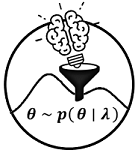# noqa SPDX-FileCopyrightText: 2024 Florence Bockting <florence.bockting@tu-dortmund.de>
#
# noqa SPDX-License-Identifier: Apache-2.0
import tensorflow as tf
import tensorflow_probability as tfp
tfd = tfp.distributions
# initalize generator model
[docs]
class Priors(tf.Module):
"""
Initializes the hyperparameters of the prior distributions.
Attributes
----------
ground_truth : bool
whether samples are drawn from a true prior ('oracle')
global_dict : dict
dictionary containing all user and default input settings
logger : logging method
retrieves module name for passing it to the logger
init_priors : dict
initialized hyperparameters (i.e., trainable variables);
None if ground_truth = True
"""
[docs]
def __init__(self, ground_truth, init_matrix_slice, trainer, parameters,
network, expert, seed):
"""
Initializes the hyperparameters (i.e., trainable variables)
Parameters
----------
ground_truth : bool
whether samples are drawn from a true prior ('oracle')
global_dict : dict
dictionary containing all user and default input settings.
"""
self.ground_truth = ground_truth
self.init_matrix_slice = init_matrix_slice
self.trainer=trainer
self.parameters=parameters
self.network=network
self.expert=expert
# set seed
tf.random.set_seed(seed)
# initialize hyperparameter for learning (if true hyperparameter
# are given, no initialization is needed)
if not self.ground_truth:
self.init_priors = intialize_priors(
self.init_matrix_slice, self.trainer["method"], seed,
self.parameters, self.network)
else:
self.init_priors = None
[docs]
def __call__(self):
"""
Samples from the initialized prior distribution(s).
Returns
-------
prior_samples : dict
Samples from prior distribution(s).
"""
prior_samples = sample_from_priors(
self.init_priors, self.ground_truth, self.trainer["num_samples"],
self.trainer["B"], self.trainer["seed"], self.trainer["method"],
self.parameters, self.network, self.expert
)
return prior_samples
[docs]
def intialize_priors(init_matrix_slice, method, seed, parameters, network):
"""
Initialize prior distributions.
Parameters
----------
global_dict : dict
dictionary including all user-and default input settings.
Returns
-------
init_prior : dict
returns initialized prior distributions ready for sampling.
"""
# set seed
tf.random.set_seed(seed)
if method == "parametric_prior":
# create dict with all hyperparameters
hyp_dict = dict()
hp_keys=list()
param_names=list()
hp_names=list()
initialized_hyperparam = dict()
for i in range(len(parameters)):
hyp_dict[f"param{i}"] = parameters[i]["hyperparams"]
param_names += [parameters[i]["name"]]*len(parameters[i]["hyperparams"])
hp_keys += list(parameters[i]["hyperparams"].keys())
for j in range(len(parameters[i]["hyperparams"])):
current_key = list(parameters[i]["hyperparams"].keys())[j]
hp_names.append(parameters[i]["hyperparams"][current_key]["name"])
checked_params=list()
for j, (i, hp_n, hp_k) in enumerate(zip(tf.unique(param_names).idx,
hp_names, hp_keys)):
hp_dict = parameters[i]["hyperparams"][hp_k]
if hp_dict["shared"] and hp_dict["name"] in checked_params:
pass
#initialized_hyperparam[f"{hp_k}"] = initialized_hyperparam[f"{hp_k}"]
else:
# get initial value
initial_value = init_matrix_slice[hp_n]
# initialize hyperparameter
initialized_hyperparam[f"{hp_k}_{hp_n}"] = tf.Variable(
initial_value=hp_dict["constraint"](initial_value),
trainable=True,
name=f"{hp_n}",
)
# save initialized priors
init_prior = initialized_hyperparam
if hp_dict["shared"]:
checked_params.append(hp_n)
if method == "deep_prior":
# for more information see BayesFlow documentation
# https://bayesflow.org/api/bayesflow.inference_networks.html
INN = network["inference_network"]
invertible_neural_network = INN(**network["network_specs"])
# save initialized priors
init_prior = invertible_neural_network
return init_prior
[docs]
def sample_from_priors(initialized_priors, ground_truth, num_samples, B, seed,
method, parameters, network, expert):
"""
Samples from initialized prior distributions.
Parameters
----------
initialized_priors : dict
initialized prior distributions ready for sampling.
ground_truth : bool
whether simulations are based on ground truth
(then sampling is performed from true distribution).
global_dict : dict
dictionary including all user-input settings..
Returns
-------
prior_samples : dict
Samples from prior distributions.
"""
# set seed
tf.random.set_seed(seed)
if ground_truth:
# number of samples for ground truth
rep_true = expert["num_samples"]
priors = []
for prior in list(expert["ground_truth"].values()):
# sample from the prior distribution
priors.append(prior.sample((1, rep_true)))
# this is a workaround for the changed shape when a
# multivariate prior is used
if type(priors[0]) is list:
prior_samples = tf.concat(priors[0], axis=-1)
elif tf.rank(priors[0]) > 2:
prior_samples = tf.concat(priors, axis=-1)
else:
prior_samples = tf.stack(priors, axis=-1)
if (method == "parametric_prior") and (not ground_truth):
priors = []
for i in range(len(parameters)):
# get the prior distribution family as specified by the user
prior_family = parameters[i]["family"]
hp_k=list(parameters[i]["hyperparams"].keys())
init_dict={}
for k in hp_k:
hp_n=parameters[i]["hyperparams"][k]["name"]
init_key = f"{k}_{hp_n}"
init_dict[f"{k}"]=initialized_priors[init_key]
# sample from the prior distribution
priors.append(
prior_family(**init_dict).sample((B, num_samples))
)
# stack all prior distributions into one tf.Tensor of
# shape (B, S, num_parameters)
prior_samples = tf.concat(priors, axis=-1)
if (method == "deep_prior") and (not ground_truth):
# initialize base distribution
base_dist = network["base_distribution"](num_params=len(parameters))
# sample from base distribution
u = base_dist.sample((B, num_samples))
# apply transformation function to samples from base distr.
prior_samples, _ = initialized_priors(u, condition=None, inverse=False)
return prior_samples
[docs]
def softmax_gumbel_trick(epred: float, likelihood: callable,
upper_thres: float, temp: float, seed: int):
"""
The softmax-gumbel trick computes a continuous approximation of ypred from
a discrete likelihood and thus allows for the computation of gradients for
discrete random variables.
Currently this approach is only implemented for models without upper
boundary (e.g., Poisson model).
Corresponding literature:
- Maddison, C. J., Mnih, A. & Teh, Y. W. The concrete distribution:
A continuous relaxation of
discrete random variables in International Conference on Learning
Representations (2017). https://doi.org/10.48550/arXiv.1611.00712
- Jang, E., Gu, S. & Poole, B. Categorical reparameterization with
gumbel-softmax in International Conference on Learning Representations
(2017). https://openreview.net/forum?id=rkE3y85ee.
- Joo, W., Kim, D., Shin, S. & Moon, I.-C. Generalized gumbel-softmax
gradient estimator for generic discrete random variables.
Preprint at https://doi.org/10.48550/arXiv.2003.01847 (2020).
Parameters
----------
model_simulations : dict
dictionary containing all simulated output variables from the
generative model.
global_dict : dict
dictionary including all user-input settings.
Returns
-------
ypred : tf.Tensor
continuously approximated ypred from the discrete likelihood.
"""
# set seed
tf.random.set_seed(seed)
# get batch size
B = epred.shape[0]
# get number of simulations from priors
S = epred.shape[1]
# get number of observations
number_obs = epred.shape[2]
# constant outcome vector (including zero outcome)
thres = upper_thres
c = tf.range(thres + 1, delta=1, dtype=tf.float32)
# broadcast to shape (B, rep, outcome-length)
c_brct = tf.broadcast_to(c[None, None, None, :], shape=(B, S, number_obs,
len(c)))
# compute pmf value
pi = likelihood.prob(c_brct)
# prevent underflow
pi = tf.where(pi < 1.8 * 10 ** (-30), 1.8 * 10 ** (-30), pi)
# sample from uniform
u = tfd.Uniform(0, 1).sample((B, S, number_obs, len(c)))
# generate a gumbel sample from uniform sample
g = -tf.math.log(-tf.math.log(u))
# softmax gumbel trick
w = tf.nn.softmax(
tf.math.divide(
tf.math.add(tf.math.log(pi), g), temp,
)
)
# reparameterization/linear transformation
ypred = tf.reduce_sum(tf.multiply(w, c), axis=-1)
return ypred
[docs]
def simulate_from_generator(prior_samples, seed, model):
"""
Simulates data from the specified generative model.
Parameters
----------
prior_samples : dict
samples from prior distributions.
global_dict : dict
dictionary including all user-input settings.
Returns
-------
model_simulations : dict
simulated data from generative model.
"""
# set seed
tf.random.set_seed(seed)
# get model and initialize generative model
GenerativeModel = model["obj"]
generative_model = GenerativeModel()
# get model specific arguments (that are not prior samples)
add_model_args = model.copy()
add_model_args.pop("obj")
add_model_args["seed"]=seed
# simulate from generator
if add_model_args is not None:
model_simulations = generative_model(prior_samples, **add_model_args)
else:
model_simulations = generative_model(prior_samples)
return model_simulations

